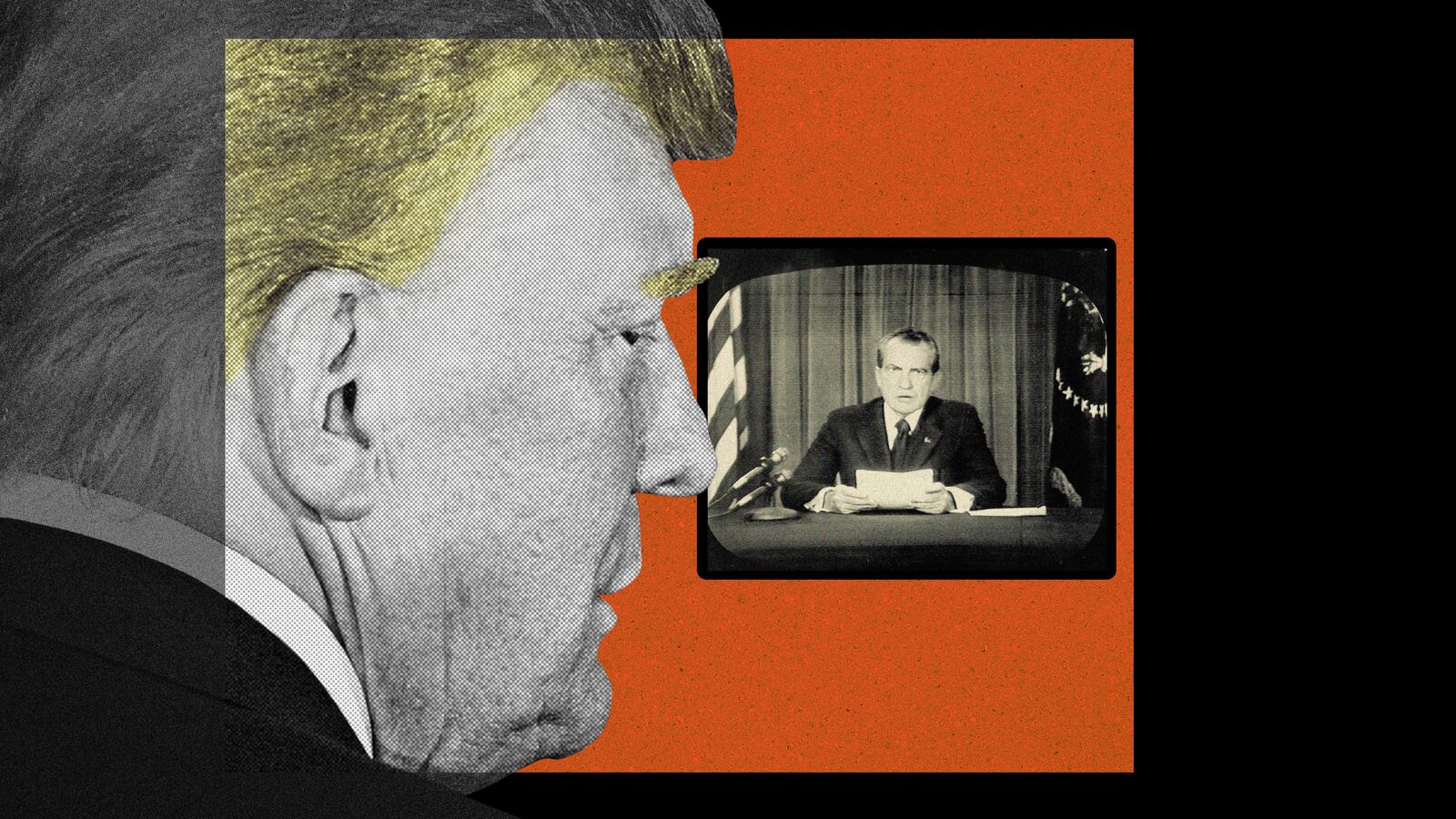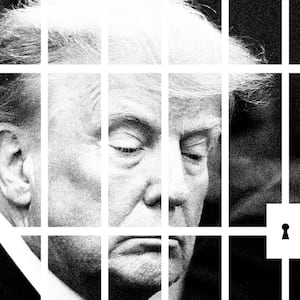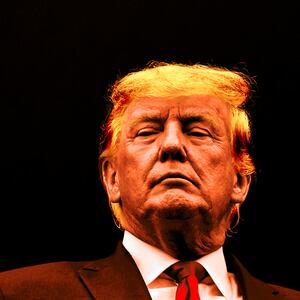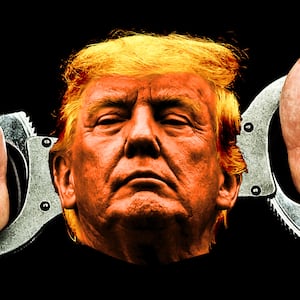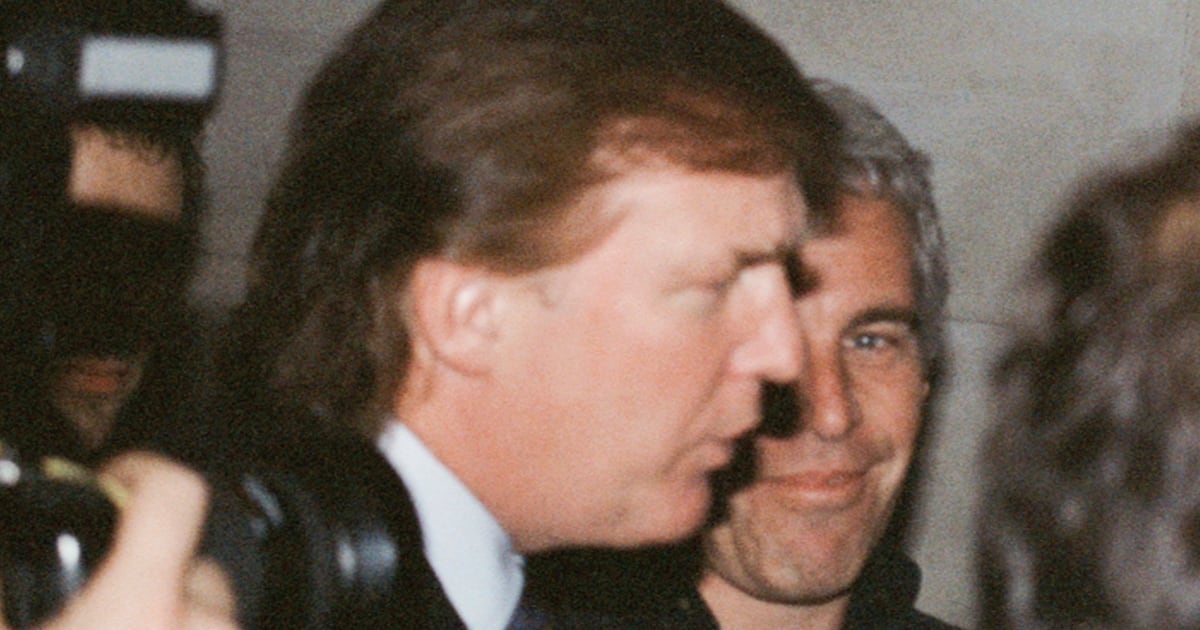Get more news and opinions in the twice-daily Beast Digest newsletter. Don’t miss the next big story, sign up here.
President Gerald Ford believed he did the right thing when in 1974 he pardoned his predecessor, Richard Nixon, of any criminality connected to the cover-up of the Watergate scandal that had forced Nixon to be the first (and to date, only) president to resign from office.
Like many Americans at the time, I was furious at Ford for preempting what surely would have been an indictment for obstruction of justice and related crimes, and I was convinced there had been some secret deal to let Nixon get away with crimes that sent others in his administration to prison. Nixon should have been prosecuted, not pardoned.
Had that happened, former President Donald Trump wouldn’t be poised to travel the country, campaigning for president without much of a platform beyond, “I’m the first president to be indicted in a partisan witch hunt, the 2020 election was stolen from me by the Democrats—and only I can fix it!”
If Ford, 49 years ago, had performed his duty to the country and the Constitution, Trump would just be another ex-president who went off the rails—not the far-and-away frontrunner for the 2024 GOP nomination.
“The sonofabitch pardoned the sonofabitch,” is how Washington Post reporter Carl Bernstein broke the news to his partner Bob Woodward on Sept. 8, 1974. Those five words summed it up for me and many of my generation. A Gallup poll at the time showed 53 percent of those surveyed disapproved of the pardon, a number that would be transposed a dozen years later, in 1986, to 54 percent of Americans approving of the pardon.
It wasn’t for another 15 years, in 2001, when I softened my view on Ford’s pardon of Nixon. Sen. Ted Kennedy awarded Ford the “Profile in Courage” from the John F. Kennedy Library, saying, “I was one of those who spoke out against his action then. But time has a way of clarifying past events, and now we see that President Ford was right. His courage and dedication to our country made it possible for us to begin the process of healing and put the tragedy of Watergate behind us.”
If Kennedy saw the pardon in a different light, that was enough for me. And if we never had another president who secretly or openly defied the rule of law, we could leave it there.
Trump—lawless, reckless, corrupt, and preternaturally dishonest—changed everything.
Now I’m back to where I was originally. Gerald Ford was wrong. No president should be above the law.
Trump is testing that proposition, running for president as a shield to protect himself from the law. And his indictment in Manhattan on charges related to hush money payments to a porn star are the least consequential of looming prosecutions. A Georgia DA has him on tape trying to intimidate Republican election officials into “finding” enough votes for him to win. And the feds are looking into his incitement of the Jan. 6 Capitol riot, as well as his theft and prolonged storage of highly classified documents at his Mar-a-Lago estate.

US President Gerald Ford signs a document granting former President Richard Nixon a full pardon, at the White House in Washington on Sept. 8, 1974.
UPI/Bettmann Archive/Getty ImagesThe safest place for Trump, from a legal jeopardy standpoint, is on the campaign trail. And it all goes back to the Nixon pardon.
Ford testified before Congress in October 1974 to explain the pardon, telling the House Judiciary committee that an indictment followed by a trial and potential conviction would consume the country’s attention, that it was time to close the Watergate chapter.
Tom DeFrank, author of Write It When I’m Gone (2008) about his off-the-record interviews with Ford over 32 years, told The Daily Beast. “Ford would still believe the pardon was the right thing for the country at the time. But given his sense of personal probity and respect for the office, he would have been appalled by the way Trump behaved as president. So I suspect that he’d believe Trump should be pursued to the full extent of the law.”
After Ford pardoned him, Nixon coined a phrase in an interview with British journalist David Frost that presidents were above law, saying, “When the president does it, that means it is not illegal.”
That is the legacy of the Ford pardon.
It took 40 years for those of us who wanted to wish away Nixon as an oddity to understand the poison tree that was planted. Richard Ben-Veniste, one of the Watergate prosecutors, told The Daily Beast in an email that after Nixon’s resignation, he wrote a memo to his boss, Leon Jaworski, the special prosecutor for Watergate, arguing that “citizen Nixon should be indicted for conspiracy to obstruct justice.” (Jaworski had named Nixon as an unindicted co-conspirator, and Ben-Veniste hoped the former president would be held to account in a separate indictment.) The looming prospect of a pardon clouded the issue.
“Jaworski was unwilling to present such an indictment to the grand jury if President Ford had decided that he would eventually pardon Nixon,” Ben-Veniste continued. “Although Ford had initially said that he would not pardon Nixon until such time as the need to decide that question reached his desk, he changed course and issued a pardon without waiting for an indictment or requiring Nixon to acknowledge his criminal misconduct. I have always felt that the timing of Ford’s unconditional pardon of Nixon was wrong. Had Ford made clear that he would not issue a pardon until such time as the charges against Nixon were set forth in a formal indictment, history would have had a clearer precedent for how our democracy should respond to serious criminal conduct by a former president.”
Can’t get enough from The Daily Beast? Subscribe to the twice-daily Beast Digest newsletter here.
In a follow-up phone call, Ben-Veniste said he did not condemn Ford’s action. He saw it as a political decision. It was the timing that was wrong. “He should have waited for an indictment, or an acknowledgement of criminal conduct by Nixon.”
As it was, Nixon spent the last 20 years of his life contending he’d been railroaded from office, and many analysts are convinced that if Fox News and the right-wing media industry existed in 1974, Nixon could have ridden out the charges the way Trump is gearing up to do today.

TV image of President Richard Nixon announcing his decision to resign on Aug. 9, 1974.
Tom Middlemiss/NY Daily News Archive via Getty ImagesWe could have been spared all the theater surrounding Trump today if Ford had let the justice system work instead of capitulating to pressure from Nixon allies that the discredited president was depressed and might be suicidal. Presidential historian Michael Beschloss posted a tweet in December 2022 noting, “Before Nixon was pardoned by President Ford, he called up friends in Congress, saying he was having nightmares about being in prison and the cell door swinging shut.”
Ford acted preemptively to short-circuit the legal process, and he justified it by relying on a 1915 Supreme Court decision, Burdick v. United States, that says a pardon carries an “imputation of guilt” and its acceptance is a “confession of guilt.” Ford carried a piece of paper in his wallet with the text from the Burdick decision. He would pull it out and read from the dog-eared copy whenever anyone brought up the pardon.
Meanwhile, Manhattan DA Alvin Bragg was on the defensive for bringing allegedly insignificant and outdated charges against Trump about hush money paid to silence a building doorman, a Playboy model, and an adult film star to keep voters from knowing damaging information that might have affected the outcome of the 2016 election.
Would Bragg have brought 34 felony counts attached to each check and document if the case involved Donald J. Trump, real estate developer, and not a former president? And why now, reporters wanted to know?
Bragg answered questions calmly, noting these payment schemes were set up just weeks before the election, and it’s a felony to falsify business records made to cover up other crimes. These are criminal cases in New York state, the DA said.
Trump said nothing and sat stone-faced through his arraignment. Oh, the irony. He was in a courtroom charged with election interference in the race he won. His supporters had chanted “Lock her up.”
A long legal road stretches ahead, and the only thing certain is that the impact on the country of a former president being charged with a crime—that Gerald Ford hoped to head off—is now before us.
Sign up for the Beast Digest, a twice-daily run down on each day’s top stories. Don’t miss out, sign up here.

